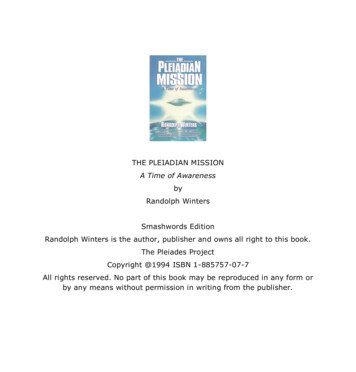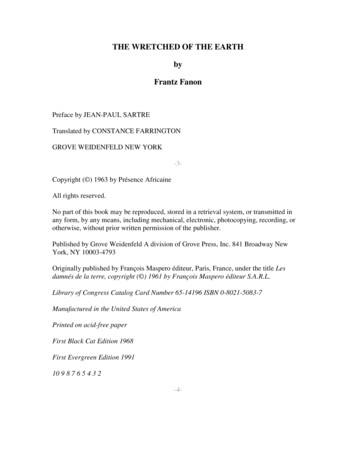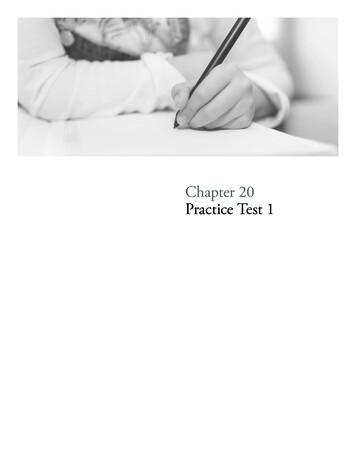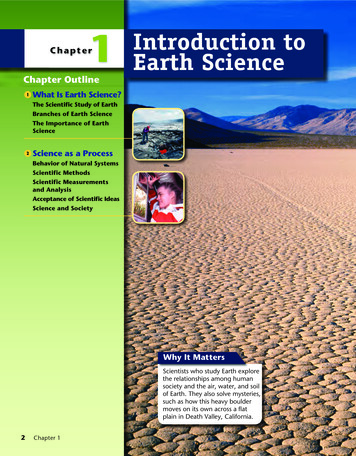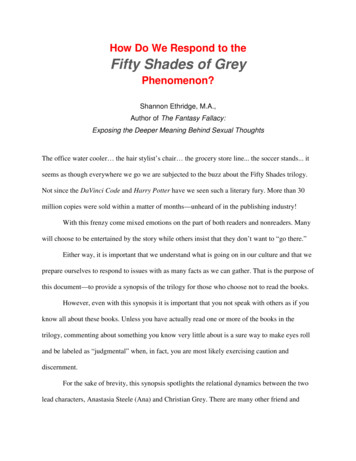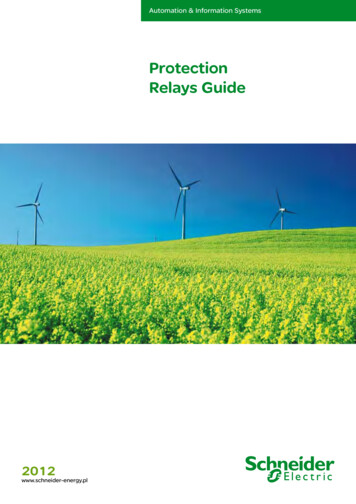
Transcription
THE WRETCHED OF THE EARTHbyFrantz FanonPreface by JEAN-PAUL SARTRETranslated by CONSTANCE FARRINGTONGROVE WEIDENFELD NEW YORK-3Copyright ( ) 1963 by Présence AfricaineAll rights reserved.No part of this book may be reproduced, stored in a retrieval system, or transmitted inany form, by any means, including mechanical, electronic, photocopying, recording, orotherwise, without prior written permission of the publisher.Published by Grove Weidenfeld A division of Grove Press, Inc. 841 Broadway NewYork, NY 10003-4793Originally published by François Maspero éditeur, Paris, France, under the title Lesdamnés de la terre, copyright ( ) 1961 by François Maspero éditeur S.A.R.L.Library of Congress Catalog Card Number 65-14196 ISBN 0-8021-5083-7Manufactured in the United States of AmericaPrinted on acid-free paperFirst Black Cat Edition 1968First Evergreen Edition 199110 9 8 7 6 5 4 3 2-4-
CONTENTSPrefaceConcerning ViolenceViolence in the International ContextSpontaneity: Its Strength and WeaknessThe Pitfalls of National ConsciousnessOn National CultureColonial War and Mental DisordersSeries ASeries BSeries CSeries CENot so very long ago, the earth numbered two thousand million inhabitants: five hundredmillion men, and one thousand five hundred million natives. The former had the Word;the others had the use of it. Between the two there were hired kinglets, overlords, and abourgeoisie, sham from beginning to end, which served as go-betweens. In the coloniesthe truth stood naked, but the citizens of the mother country preferred it with clothes on:the native had to love them, something in the way mothers are loved. The European eliteundertook to manufacture a native elite. They picked out promising adolescents; theybranded them, as with a red-hot iron, with the principles of Western culture; they stuffedtheir mouths full with high-sounding phrases, grand glutinous words that stuck to theteeth. After a short stay in the mother country they were sent home, whitewashed. Thesewalking lies had nothing left to say to their brothers; they only echoed. From Paris, fromLondon, from Amsterdam we would utter the words "Parthenon! Brotherhood!" andsomewhere in Africa or Asia lips would open ".thenon! .therhood!" It was the goldenage.It came to an end; the mouths opened by themselves; the yellow and black voices stillspoke of our humanism-7but only to reproach us with our inhumanity. We listened without displeasure to thesepolite statements of resentment, at first with proud amazement. What? They are able totalk by themselves? Just look at what we have made of them! We did not doubt but thatthey would accept our ideals, since they accused us of not being faithful to them. Then,indeed, Europe could believe in her mission; she had hellenized the Asians; she hadcreated a new breed, the Greco-Latin Negroes. We might add, quite between ourselves,as men of the world: "After all, let them bawl their heads off, it relieves their feelings;dogs that bark don't bite."
A new generation came on the scene, which changed the issue. With unbelievablepatience, its writers and poets tried to explain to us that our values and the true facts oftheir lives did not hang together, and that they could neither reject them completely noryet assimilate them. By and large, what they were saying was this: "You are making usinto monstrosities; your humanism claims we are at one with the rest of humanity butyour racist methods set us apart." Very much at our ease, we listened to them all; colonialadministrators are not paid to read Hegel, and for that matter they do not read much ofhim, but they do not need a philosopher to tell them that uneasy consciences are caughtup in their own contradictions. They will not get anywhere; so, let us perpetuate theirdiscomfort; nothing will come of it but talk. If they were, the experts told us, asking foranything at all precise in their wailing, it would be integration. Of course, there is noquestion of granting that; the system, which depends on overexploitation, as you know,would be mined. But it's enough to hold the carrot in front of their noses, they'll gallop allright. As to a revolt, we need not worry at all; what native in his senses would go off tomassacre the fair sons of Europe simply to become European as-8they are? In short, we encouraged these disconsolate spirits and thought it not a bad ideafor once to award the Prix Goncourt to a Negro. That was before '39.1961. Listen: "Let us waste no time in sterile litanies and nauseating mimicry. Leave thisEurope where they are never done talking of Man, yet murder men everywhere they findthem, at the corner of every one of their own streets, in all the corners of the globe. Forcenturies they have stifled almost the whole of humanity in the name of a so-calledspiritual experience." The tone is new. Who dares to speak thus? It is an African, a manfrom the Third World, an ex-"native." He adds: " Europe now lives at such a mad,reckless pace that she is running headlong into the abyss; we would do well to keep awayfrom it." In other words, she's done for. A truth which is not pleasant to state but of whichwe are all convinced, are we not, fellow-Europeans, in the marrow of our bones?We must however make one reservation. When a Frenchman, for example, says to otherFrenchmen, "The country is done for"--which has happened, I should think, almost everyday since 1930--it is emotional talk; burning with love and fury, the speaker includeshimself with his fellowcountrymen. And then, usually, he adds, "Unless." His meaningis clear; no more mistakes must be made; if his instructions are not carried out to theletter, then and only then will the country go to pieces. In short, it is a threat followed bya piece of advice and these remarks are so much the less shocking in that they springfrom a national intersubjectivity. But on the contrary, when Fanon says of Europe thatshe is rushing to her doom, far from sounding the alarm he is merely setting out adiagnosis. This doctor neither claims that she is a hopeless case -miracles have beenknown to exist--nor does he give her the means to cure herself. He certifies that she isdying, on external evidence, founded on symptoms that he can-9-
observe. As to curing her, no; he has other things to think about; he does not give a damnwhether she lives or dies. Because of this, his book is scandalous. And if you murmur,jokingly embarrassed, "He has it in for us!" the true nature of the scandal escapes you; forFanon has nothing in for you at all; his work--red-hot for some--in what concerns you isas cold as ice; he speaks of you often, never to you. The black Goncourts and the yellowNobels are finished; the days of colonized laureates are over. An ex-native, Frenchspeaking, bends that language to new requirements, makes use of it, and speaks to thecolonized only: "Natives of all underdeveloped countries, unite? What a downfall! Forthe fathers, we alone were the speakers; the sons no longer even consider us as validintermediaries: we are the objects of their speeches. Of course, Fanon mentions inpassing our well-known crimes: Sétif, Hanoi, Madagascar: but he does not waste his timein condemning them; he uses them. If he demonstrates the tactics of colonialism, thecomplex play of relations which unite and oppose the colonists to the people of themother country, it is for his brothers; his aim is to teach them to beat us at our own game.In short, the Third World finds itself and speaks to itself through his voice. We know thatit is not a homogeneous world; we know too that enslaved peoples are still to be foundthere, together with some who have achieved a simulacrum of phony independence,others who are still fighting to attain sovereignty and others again who have obtainedcomplete freedom but who live under the constant menace of imperialist aggression.These differences are born of colonial history, in other words of oppression. Here, themother country is satisfied to keep some feudal rulers in her pay; there, dividing andruling she has created a native bourgeoisie, sham from beginning to end; elsewhere shehas played a double game: the-10colony is planted with settlers and exploited at the same time. Thus Europe has multiplieddivisions and opposing groups, has fashioned classes and sometimes even racialprejudices, and has endeavored by every means to bring about and intensify thestratification of colonized societies. Fanon hides nothing: in order to fight against us theformer colony must fight against itself: or, rather, the two struggles form part of a whole.In the heat of battle, all internal barriers break down; the puppet bourgeoisie ofbusinessmen and shopkeepers, the urban proletariat, which is always in a privilegedposition, the lumpenproletariat of the shanty towns--all fall into line with the stand madeby the rural masses, that veritable reservoir of a national revolutionary army; for in thosecountries where colonialism has deliberately held up development, the peasantry, when itrises, quickly stands out as the revolutionary class. For it knows naked oppression, andsuffers far more from it than the workers in the towns, and in order not to die of hunger, itdemands no less than a complete demolishing of all existing structures. In order totriumph, the national revolution must be socialist; if its career is cut short, if the nativebourgeoisie takes over power, the new state, in spite of its formal sovereignty, remains inthe hands of the imperialists. The example of Katanga illustrates this quite well. Thus theunity of the Third World is not yet achieved. It is a work in progress, which begins by theunion, in each country, after independence as before, of the whole of the colonizedpeople under the command of the peasant class. This is what Fanon explains to his
brothers in Africa, Asia, and Latin America: we must achieve revolutionary socialism alltogether everywhere, or else one by one we will be defeated by our former masters. Hehides nothing, neither weaknesses, nor discords, nor mystification. Here, the movementgets off to a bad start; there, after a striking initial success it loses momentum;-11elsewhere it has come to a standstill, and if it is to start again, the peasants must throwtheir bourgeoisie overboard. The reader is sternly put on his guard against the mostdangerous will o' the wisps: the cult of the leader and of personalities, Western culture,and what is equally to be feared, the withdrawal into the twilight of past African culture.For the only true culture is that of the revolution; that is to say, it is constantly in themaking. Fanon speaks out loud; we Europeans can hear him, as the fact that you hold thisbook in your hand proves; is he not then afraid that the colonial powers may takeadvantage of his sincerity?No; he fears nothing. Our methods are out-of-date; they can sometimes delayemancipation, but not stop it. And do not think that we can change our ways; neocolonialism, that idle dream of mother countries, is a lot of hot air; the "Third Forces"don't exist, or if they do they are only the tin-pot bourgeoisies that colonialism hasalready placed in the saddle. Our Machiavellianism has little purchase on this wideawake world that has run our falsehoods to earth one after the other. The settler has onlyrecourse of one thing: brute force, when he can command it; the native has only onechoice, between servitude or supremacy. What does Fanon care whether you read hiswork or not? It is to his brothers that he denounces our old tricks, and he is sure we haveno more up our sleeves. It is to them he says: "Europe has laid her hands on ourcontinents, and we must slash at her fingers till she lets go. It's a good moment; nothingcan happen at Bizerta, at Elizabethville or in the Algerian bled * that the whole worlddoes not hear about. The rival blocs take opposite sides, and hold each other in check; letus take advantage of this paralysis, let us burst into history, forcing*Up-country in North Africa.--Trans.-12it by our invasion into universality for the first time. Let us start fighting; and if we've noother arms, the waiting knife's enough."Europeans, you must open this book and enter into it. After a few steps in the darknessyou will see strangers gathered around a fire; come close, and listen, for they are talkingof the destiny they will mete out to your trading centers and to the hired soldiers whodefend them. They will see you, perhaps, but they will go on talking among themselves,without even lowering their voices. This indifference strikes home: their fathers, shadowycreatures, your creatures, were but dead souls; you it was who allowed them glimpses oflight, to you only did they dare speak, and you did not bother to reply to such zombies.
Their sons ignore you; a fire warms them and sheds light around them, and you have notlit it. Now, at a respectful distance, it is you who will feel furtive, nightbound, andperished with cold. Turn and turn about; in these shadows from whence a new dawn willbreak, it is you who are the zombies.In this case, you will say, let's throw away this book. Why read it if it is not written forus? For two reasons: the first is that Fanon explains you to his brothers and shows themthe mechanism by which we are estranged from ourselves; take advantage of this, and getto know yourselves seen in the light of truth, objectively. Our victims know us by theirscars and by their chains, and it is this that makes their evidence irrefutable. It is enoughthat they show us what we have made of them for us to realize what we have made ofourselves. But is it any use? Yes, for Europe is at death's door. But, you will say, we livein the mother country, and we disapprove of her excesses. It is true, you are not settlers,but you are no better. For the pioneers belonged to you; you sent them overseas, and itwas you they enriched. You warned them-13that if they shed too much blood you would disown them, or say you did, in something ofthe same way as any state maintains abroad a mob of agitators, agents provocateurs, andspies whom it disowns when they are caught. You, who are so liberal and so humane,who have such an exaggerated adoration of culture that it verges on affectation, youpretend to forget that you own colonies and that in them men are massacred in yourname. Fanon reveals to his comrades--above all to some of them who are rather tooWesternized--the solidarity of the people of the mother country and of theirrepresentatives in the colonies. Have the courage to read this book, for in the first place itwill make you ashamed, and shame, as Marx said, is a revolutionary sentiment. You see,I, too, am incapable of ridding myself of subjective illusions; I, too, say to you: "All islost, unless." As a European, I steal the enemy's book, and out of it I fashion a remedyfor Europe. Make the most of it.And here is the second reason: if you set aside Sorel's fascist utterances, you will find thatFanon is the first since Engels to bring the processes of history into the clear light of day.Moreover, you need not think that hotheadedness or an unhappy childhood has given himsome uncommon taste for violence; he acts as the interpreter of the situation, that's all.But this is enough to enable him to constitute, step by step, the dialectic which liberalhypocrisy hides from you and which is as much responsible for our existence as for his.During the last century, the middle classes looked on the workers as covetous creatures,made lawless by their greedy desires; but they took care to include these great brutes inour own species, or at least they considered that they were free men--that is to say, free tosell their labor. In France, as in England, humanism claimed to be universal.-14-
In the case of forced labor, it is quite the contrary. There is no contract; moreover, theremust be intimidation and thus oppression grows. Our soldiers overseas, rejecting theuniversalism of the mother country, apply the "numerus clausus" to the human race: sincenone may enslave, rob, or kill his fellow man without committing a crime, they lay downthe principle that the native is not one of our fellow men. Our striking power has beengiven the mission of changing this abstract certainty into reality: the order is given toreduce the inhabitants of the annexed country to the level of superior monkeys in order tojustify the settler's treatment of them as beasts of burden. Violence in the colonies doesnot only have for its aim the keeping of these enslaved men at arm's length; it seeks todehumanize them. Everything will be done to wipe out their traditions, to substitute ourlanguage for theirs and to destroy their culture without giving them ours. Sheer physicalfatigue will stupefy them. Starved and ill, if they have any spirit left, fear will finish thejob; guns are leveled at the peasant; civilians come to take over his land and force him bydint of flogging to till the land for them. If he shows fight, the soldiers fire and he's adead man; if he gives in, he degrades himself and he is no longer a man at all; shame andfear will split up his character and make his inmost self fall to pieces. The business isconducted with flying colors and by experts; the "psychological services" weren'testablished yesterday; nor was brainwashing. And yet, in spite of all these efforts, theirends are nowhere achieved: neither in the Congo, where Negroes' hands were cut off, norin Angola, where until very recently malcontents' lips were pierced in order to shut themwith padlocks. I do not say that it is impossible to change a man into an animal: I simplysay that you won't get there without weakening him considerably. Blows will neversuffice; you have to push the-15starvation further, and that's the trouble with slavery.For when you domesticate a member of our own species, you reduce his output, andhowever little you may give him, a farmyard man finishes by costing more than he bringsin. For this reason the settlers are obliged to stop the breaking-in halfway; the result,neither man nor animal, is the native. Beaten, undernourished, ill, terrified -but only up toa certain point--he has, whether he's black, yellow, or white, always the same traits ofcharacter: he's a sly-boots, a lazybones, and a thief, who lives on nothing, and whounderstands only violence.Poor settler; here is his contradiction naked, shorn of its trappings. He ought to kill thosehe plunders, as they say djinns do. Now, this is not possible, because he must exploitthem as well. Because he can't carry massacre on to genocide, and slavery to animal-likedegradation, he loses control, the machine goes into reverse, and a relentless logic leadshim on to decolonization.But it does not happen immediately. At first the European's reign continues. He hasalready lost the battle, but this is not obvious; he does not yet know that the natives areonly half native; to hear him talk, it would seem that he ill-treats them in order to destroyor to repress the evil that they have rooted in them; and after three generations their
pernicious instincts will reappear no more. What instincts does he mean? The instinctsthat urge slaves on to massacre their master? Can he not here recognize his own crueltyturned against himself? In the savagery of these oppressed peasants, does he not find hisown settler's savagery, which they have absorbed through every pore and for which thereis no cure? The reason is simple; this imperious being, crazed by his absolute power andby the fear of losing it, no longer remembers clearly that he was once a man; he takeshimself for a horsewhip or a gun; he has come to believe that the domestication of the-16"inferior races" will come about by the conditioning of their reflexes. But in this heleaves out of account the human memory and the ineffaceable marks left upon it; andthen, above all there is something which perhaps he has never known: we only becomewhat we are by the radical and deep-seated refusal of that which others have made of us.Three generations did we say? Hardly has the second generation opened their eyes thanfrom then on they've seen their fathers being flogged. In psychiatric terms, they are"traumatized" for life. But these constantly renewed aggressions, far from bringing themto submission, thrust them into an unbearable contradiction which the European will payfor sooner or later. After that, when it is their turn to be broken in, when they are taughtwhat shame and hunger and pain are, all that is stirred up in them is a volcanic furywhose force is equal to that of the pressure put upon them. You said they understandnothing but violence? Of course; first, the only violence is the settler's; but soon they willmake it their own; that is to say, the same violence is thrown back upon us as when ourreflection comes forward to meet us when we go toward a mirror.Make no mistake about it; by this mad fury, by this bitterness and spleen, by their everpresent desire to kill us, by the permanent tensing of powerful muscles which are afraidto relax, they have become men: men because of the settler, who wants to make beasts ofburden of them -because of him, and against him. Hatred, blind hatred which is as yet anabstraction, is their only wealth; the Master calls it forth because he seeks to reduce themto animals, but he fails to break it down because his interests stop him halfway. Thus the"half natives" are still humans, through the power and the weakness of the oppressorwhich is transformed within them into a stubborn refusal of the animal condition. Werealize what follows;-17they're lazy: of course--it's a form of sabotage. They're sly and thieving; just imagine! Buttheir petty thefts mark the beginning of a resistance which is still unorganized. That is notenough; there are those among them who assert themselves by throwing themselvesbarehanded against the guns; these are their heroes. Others make men of themselves bymurdering Europeans, and these are shot down; brigands or martyrs, their agony exaltsthe terrified masses.Yes, terrified; at this fresh stage, colonial aggression turns inward in a current of terroramong the natives. By this I do not only mean the fear that they experience when faced
with our inexhaustible means of repression but also that which their own fury produces inthem. They are cornered between our guns pointed at them and those terrifyingcompulsions, those desires for murder which spring from the depth of their spirits andwhich they do not always recognize; for at first it is not their violence, it is ours, whichturns back on itself and rends them; and the first action of these oppressed creatures is tobury deep down that hidden anger which their and our moralities condemn and which ishowever only the last refuge of their humanity. Read Fanon: you will learn how, in theperiod of their helplessness, their mad impulse to murder is the expression of the natives'collective unconscious.If this suppressed fury fails to find an outlet, it turns in a vacuum and devastates theoppressed creatures themselves. In order to free themselves they even massacre eachother. The different tribes fight between themselves since they cannot face the realenemy--and you can count on colonial policy to keep up their rivalries; the man whoraises his knife against his brother thinks that he has destroyed once and for all thedetested image of their common degradation, even though these expiatory victims don'tquench their thirst for blood. They can only stop-18themselves from marching against the machine-guns by doing our work for us; of theirown accord they will speed up the dehumanization that they reject. Under the amused eyeof the settler, they will take the greatest precautions against their own kind by setting upsupernatural barriers, at times reviving old and terrible myths, at others bindingthemselves by scrupulous rites. It is in this way that an obsessed person flees from hisdeepest needs--by binding himself to certain observances which require his attention atevery turn. They dance; that keeps them busy; it relaxes their painfully contractedmuscles; and then the dance mimes secretly, often without their knowing, the refusal theycannot utter and the murders they dare not commit. In certain districts they make use ofthat last resort--possession by spirits. Formerly this was a religious experience in all itssimplicity, a certain communion of the faithful with sacred things; now they make of it aweapon against humiliation and despair; Mumbo-Jumbo and all the idols of the tribecome down among them, rule over their violence and waste it in trances until it isexhausted. At the same time these high-placed personages protect them; in other wordsthe colonized people protect themselves against colonial estrangement by going onebetter in religious estrangement, with the unique result that finally they add the twoestrangements together and each reinforces the other. Thus in certain psychoses thehallucinated person, tired of always being insulted by his demon, one fine day startshearing the voice of an angel who pays him compliments; but the jeers don't stop for allthat; only from then on, they alternate with congratulations. This is a defense, but it isalso the end of the story; the self is disassociated, and the patient heads for madness. Letus add, for certain other carefully selected unfortunates, that other witchery of which Ihave already spoken: Western culture. If I were them, you may say, I'd prefer-19-
my Mumbo-Jumbo to their Acropolis. Very good: you've grasped the situation. But notaltogether, because you aren't them--or not yet. Otherwise you would know that theycan't choose; they must have both. Two worlds: that makes two bewitchings; they danceall night and at dawn they crowd into the churches to hear mass; each day the splitwidens. Our enemy betrays his brothers and becomes our accomplice; his brothers do thesame thing. The status of "native" is a nervous condition introduced and maintained bythe settler among colonized people with their consent.Laying claim to and denying the human condition at the same time: the contradiction isexplosive. For that matter it does explode, you know as well as I do; and we are living atthe moment when the match is put to the fuse. When the rising birth rate brings widerfamine in its wake, when these newcomers have life to fear rather more than death, thetorrent of violence sweeps away all barriers. In Algeria and Angola, Europeans aremassacred at sight. It is the moment of the boomerang; it is the third phase of violence; itcomes back on us, it strikes us, and we do not realize any more than we did the othertimes that it's we who have launched it. The "liberals" are stupefied; they admit that wewere not polite enough to the natives, that it would have been wiser and fairer to allowthem certain rights in so far as this was possible; they ask nothing better than to admitthem in batches and without sponsors to that very exclusive club, our species; and nowthis barbarous, mad outburst doesn't spare them any more than the bad settlers. The Leftat home is embarrassed; they know the true situation of the natives, the mercilessoppression they are submitted to; they do not condemn their revolt, knowing full well thatwe have done everything to provoke it. But, all the same, they think to themselves, thereare limits; these guerillas-20should be bent on showing that they are chivalrous; that would be the best way ofshowing they are men. Sometimes the Left scolds them."You're going too far; we won'tsupport you any more." The natives don't give a damn about their support; for all thegood it does them they might as well stuff it up their backsides. Once their war began,they saw this hard truth: that every single one of us has made his bit, has got somethingout of them; they don't need to call anyone to witness; they'll grant favored treatment tono one.There is one duty to be done, one end to achieve: to thrust out colonialism by everymeans in their power. The more farseeing among us will be, in the last resort, ready toadmit this duty and this end; but we cannot help seeing in this ordeal by force thealtogether inhuman means that these less-than-men make use of to win the concession ofa charter of humanity. Accord it to them at once, then, and let them endeavor by peacefulundertakings to deserve it. Our worthiest souls contain racial prejudice.They would do well to read Fanon; for he shows clearly that this irrepressible violence isneither sound and fury, nor the resurrection of savage instincts, nor even the effect ofresentment: it is man recreating himself. I think we understood this truth at one time, butwe have forgotten it--that no gentleness can efface the marks of violence; only violence
itself can destroy them. The native cures himself of colonial neurosis by thrusting out thesettler through force of arms. When his rage boils over, he rediscovers his lost innocenceand he comes to know himself in that he himself creates his self. Far removed from hiswar, we consider it as a triumph of barbarism; but of its own volition it achieves, slowlybut surely, the emancipation of the rebel, for bit by bit it destroys in him and around himthe colonial gloom. Once begun, it is a war that gives no quarter. You may fear or befeared; that is-21to say, abandon yourself to the disassociations of a sham existence or conquer yourbirthright of unity. When the peasant takes a gun in his hands, the old myths grow dimand the prohibitions are one by one forgotten. The rebel's weapon is the proof of hishumanity. For in the first days of the revolt you must kill: to shoot down a European is tokill two birds with one stone, to destroy an oppressor and the man he oppresses at thesame time: there remain a dead man, and a free man; the survivor, for the first time, feelsa national soil under his foot.
Printed on acid-free paper First Black Cat Edition 1968 First Evergreen Edition 1991 10 9 8 7 6 5 4 3 2 -4- CONTENTS . million men, and one thousand five hundred million natives. The former had

